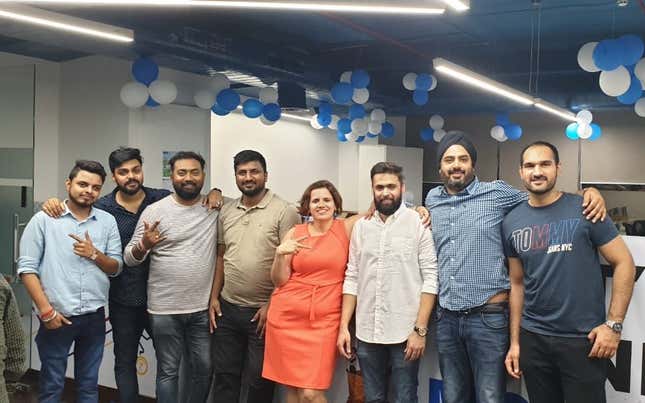In 2011, MobiKwik was a company of just four employees, trying to bring innovation to India’s fledgling digital payments industry. Over the last eight years, the Gurugram-based digital payments firm has become a fountainhead of startup entrepreneurs.
Much like the PayPal mafia—the Silicon Valley phenomenon of the early noughties where several former employees of the online payments firm established the revolutionary startups YouTube, Tesla, SpaceX, LinkedIn, and Yelp, among others—a bunch of MobiKwik’s former employees have gone on to set up their own ventures across health care technology, meat delivery, dockless bicycles, financial consulting, and public relations.
“MobiKwik has definitely inspired at least 10-15 people that I know to start something of their own,” said Virender Bisht, the firm’s former chief technology officer, who now runs NIYO Technologies, a fintech company that helps salaried employees access company benefits and other financial services.
Among the many things the entrepreneurs say they have imbibed from their time at MobiKwik are the value of a motivated team, an open work culture, and the pursuit of meaningful growth over rich valuations.
Getting the basics right
MobiKwik was the first taste of a “startup” for several of its employees and made many believe that they, too, could do something of their own.
“When I joined MobiKwik (in 2011), very few people were talking about startups. The word ‘startup’ wasn’t very well received, to be frank,” said Ankur Shrivastava, former technology manager at MobiKwik for almost six years. Shrivastava currently runs Vitraya Technologies, a 10-month-old health insurance settlement platform.
Seeing customers experience digital payments for the first time inspired several of the company’s early staff to try something of their own. “MobiKwik was founded at a stage when mobile/digital payments were just taking off in India. They weren’t a mainstream idea (yet),” said Bisht. “A lot of customers who made their first digital transaction at the time were probably doing it through MobiKwik.”
Besides inspiration, working at a young venture equipped its early staff with skills that have helped them in the long run. Shrivastava, for instance, was the first member of the tech team at MobiKwik and was tasked with building and managing the entire vertical from scratch. The role, he said, directly contributed to the process of setting up his own venture.
“Filtering people—making sure only the right people get into the organisation—doesn’t happen by default. That requires years of understanding the psyche of a person and that cannot come unless you have already interviewed hundreds of people before. That was an experience that I got directly from MobiKwik,” Shrivastava said.
Learning to pick the right team has helped him understand the most crucial ingredient of a successful startup: a motivated team. “I can say with certainty that my team is motivated now and it is because we were able to pick the right people. My team has been very stable, even though it is a startup. That stability is the outcome of the lessons that I learned at MobiKwik,” Shrivastava added.
The right work culture
At a time when hoards of ventures are crowding the fintech space in India, erstwhile employees credit co-founders Bipin Preet Singh and Upasana Taku’s free and open leadership style for MobiKwik’s longevity.
“Bipin and the team were very supportive of new ideas,” said Deepanshu Manchanda, former strategic lead at MobiKwik. “No matter which stage you are at in a startup, if the founders and the team are coherently working towards achieving growth in disruptive ways, it always adds to the profile of the contributing individual.”
Manchanda believes the work culture at MobiKwik was conducive for entrepreneurial minds to experiment and grow. “We were able to work independently, there was no micromanaging, nothing that could stop you from doing things in your own way…That independence to do things on your own was very crucial for growth.” Since leaving MobiKwik in March 2015, Manchanda has co-founded ZappFresh, a fresh meat delivery business, and hopes to emulate this work culture in his own venture.
Atul Goyal, who joined MobiKwik as an intern in 2012, said he learnt leadership from Singh and Taku, which has helped him in running his three-year-old curated travel platform MyWanderlust.in. “I would not be the leader I am now, (without) having gone through the MobiKwik journey,” said Goyal. “Leadership is not intuitive. It’s with time that you learn a lot of things and also from the people around you.”
One of the tasks that Goyal executed during his five years at MobiKwik was to set up a mobile applications team. This meant he would have to manage colleagues who were older than him, and he found that daunting. “I wasn’t comfortable (with the idea) that a younger person could lead a team of older people. But I used to talk to Bipin about it and those discussions were quite positive and helpful,” said Goyal. “Many (startup) leaders try to control things more. That’s one aspect about Bipin and Upasana that I like very much—having the space to think on your own and experiment on your own.”
The startup puzzle
For some, working at MobiKwik was like two strokes of luck: honing a skill and building the risk appetite to launch a startup. No wonder, then, that several of the company’s former employees have built ventures around what they did at MobiKwik.

For instance, Nipun Grover, who was the first member of the finance team at MobiKwik and was instrumental in helping secure funding and doing the necessary due diligence, now runs FinBrains, a “one-stop solutions provider for early-stage businesses.”
“I was with MobiKwik for three-four (funding) rounds…and I learnt all the details that an investor would be looking for,” Grover told Quartz.
Similarly, Priyanka Rana, a former data analyst at MobiKwik, has set up Cha Chi PR, a public relations (PR) company for tech startups. The 11th employee at MobiKwik, Rana felt that the PR requirements of a startup were very different from the needs of a legacy company.
Grow slowly, but meaningfully
In a recent interview with Quartz India, Singh said that MobiKwik would “rather be a cockroach than a unicorn.” This philosophy flies in the face of typical startup tendencies to secure heaps of funding in the race to top billing in terms of valuation. MobiKwik’s “mafia” very much echo this sentiment in their own ventures.
According to Shrivastava, MobiKwik has “perfected the art of making sure that spending is controlled” and he hopes to emulate this philosophy at his own business.
“As a pattern, startups that skyrocket (in terms of funding and valuation) also tend to fall down (just as quickly). Just because somebody can earn money, doesn’t mean they can spend it well,” said Shrivastava. “The longer you survive, the higher your chances of doing something meaningful. We want to grow slowly, but we also want to grow meaningfully.”
